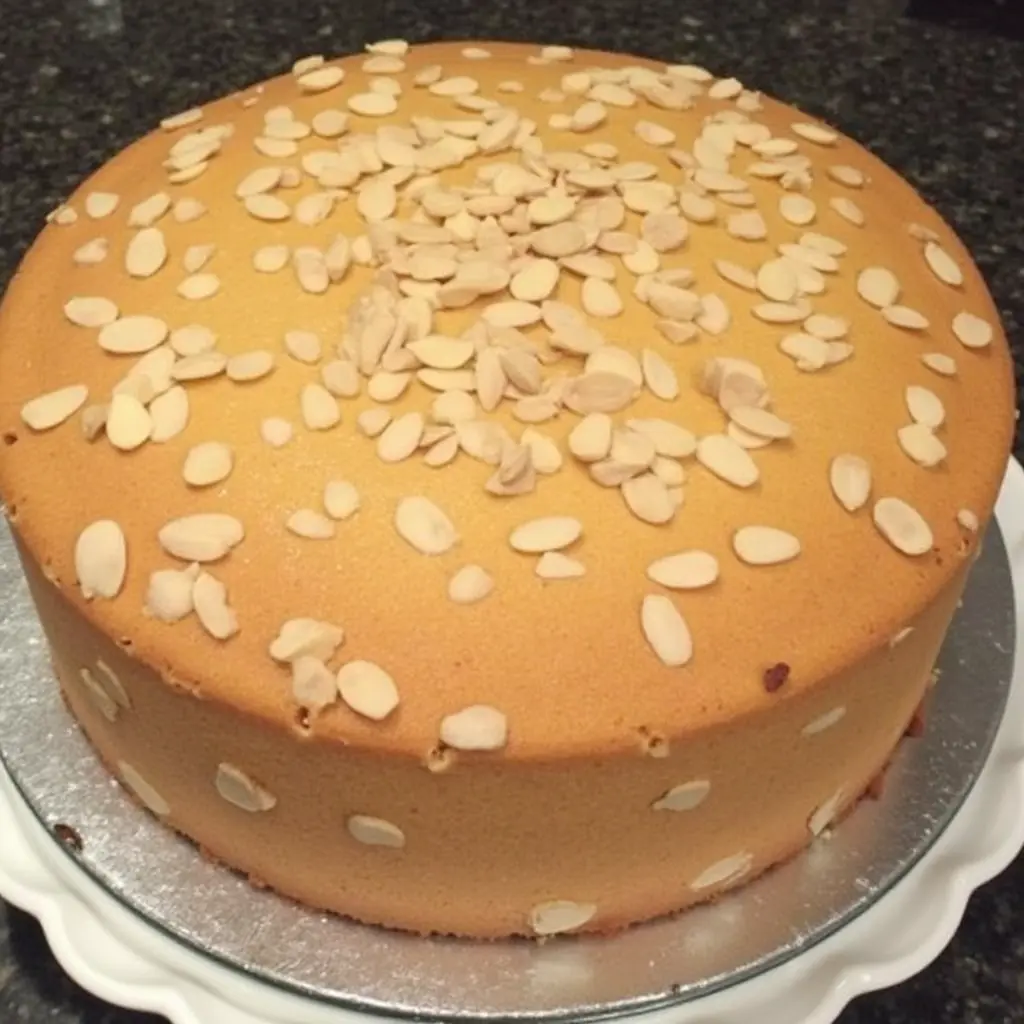Can diabetics eat almond cake? Living with diabetes doesn’t mean missing out on sweet moments. I’ve seen loved ones manage blood sugar challenges, but almond cake could be a safe and enjoyable treat.
Diabetic desserts have evolved, thanks to nuts like almonds. This guide will show you how to enjoy almond cake safely. It’s all about keeping your blood sugar in balance.

Key Takeaways
- Almonds can be a nutritious option for diabetic desserts
- Portion control is critical when enjoying almond cake
- Almond flour offers nutritional advantages for diabetic baking
- Blood sugar monitoring is essential after consuming desserts
- Smart ingredient substitutions can make desserts healthier
Understanding Almonds and Their Impact on Blood Sugar
Almonds are a nutritional powerhouse that can help manage blood sugar for those with diabetes. They offer a unique mix of health benefits. This makes them a great choice for a diabetic-friendly diet.

When looking at almond cake nutritional facts, it’s key to know how almonds affect your body. Their complex nutritional profile makes them great for controlling blood sugar.
The Glycemic Index of Almonds
Almonds have a very low glycemic index. This means they barely affect blood sugar levels. They have:
- A glycemic index of about 0
- Little insulin response
- A slow digestion rate
Blood Sugar Response to Almond Consumption
“Nuts are nature’s diabetes management tool” – Nutrition Experts
Understanding how almonds work with your body is key to managing blood sugar. When you eat almonds, they:
- Slow down glucose absorption
- Keep insulin levels stable
- Give you steady energy
Nutritional Benefits of Almonds for Diabetics
Almonds are full of nutrients that help with diabetes management. They contain:
- Magnesium: Boosts insulin sensitivity
- Healthy Fats: Lower heart disease risks
- Protein: Helps control blood sugar
Adding almonds to your diet can be a smart move for blood sugar control. You get to enjoy tasty and healthy foods.
Benefits of Using Almond Flour in Diabetic Baking
Almond flour is a big win for diabetics who love to bake. It’s a low-carb alternative to regular flour. It helps keep blood sugar levels in check and makes tasty almond flour cakes.

- Dramatically reduced carbohydrate content
- Higher protein and fiber levels
- Lower glycemic impact on blood sugar
- Nutrient-dense alternative to wheat flour
Almond flour is packed with nutrients, making it great for diabetic baking. It’s full of good stuff that helps control blood sugar.
| Nutrient | Almond Flour (1/4 cup) | Wheat Flour (1/4 cup) |
|---|---|---|
| Carbohydrates | 3g | 24g |
| Protein | 6g | 3g |
| Fiber | 3g | 1g |
“Almond flour transforms diabetic baking from restrictive to delightful” – Diabetes Nutrition Expert
Choosing almond flour for your baking is a smart move. It helps manage blood sugar and makes treats enjoyable. Every bite of your almond cake is a nutritional win for your body.
Can diabetics eat almond cake?
Choosing desserts with diabetes needs careful thought. Almond cake can be a sweet treat for those with diabetes. But, it’s important to know the details to enjoy it safely.
Portion Control Guidelines
When you have diabetes and eat almond cake, how much you eat matters a lot. Experts say:
- Stick to 2-3 small pieces
- Keep portions under 100 calories
- Watch how many carbs you’re eating
Best Times to Enjoy Almond Cake
When you eat almond cake with diabetes, when you eat it matters. The best times are:
- After a meal with protein
- In the mid-afternoon when you’re most active
- When your blood sugar is steady
Monitoring Blood Sugar After Consumption
If you’re wondering if diabetics can eat almond cake, it’s key to keep an eye on your blood sugar. Check it:
- Before you eat the cake
- 30 minutes after
- 2 hours later
“Knowledge and moderation are key when enjoying desserts with diabetes.” – American Diabetes Association
Always talk to your healthcare provider for advice on what’s best for your diabetes plan.
Essential Ingredients for Diabetes-Friendly Almond Cake
Making a tasty almond cake for diabetics means picking the right ingredients. These ingredients help manage blood sugar levels. Your cake can be both healthy and enjoyable.
When making desserts for diabetics, choose ingredients that are nutritious. They should also not raise blood sugar too much. Here are some important ingredients to think about:
- Almond flour: Low in carbs and high in protein
- Stevia or monk fruit sweeteners: Zero-glycemic natural alternatives
- Unsweetened almond milk: Reduces sugar content
- Eggs: Adds protein and helps stabilize blood sugar
- Cinnamon: Natural blood sugar regulator
It’s important to know how each ingredient affects blood sugar. Almond flour is a great choice. It has less carbs and more nutrients than regular flour.
| Ingredient | Glycemic Index | Nutritional Benefit |
|---|---|---|
| Almond Flour | Low (0-1) | High protein, low carb |
| Stevia | Zero | No caloric impact |
| Cinnamon | Low | Insulin sensitivity |
“The right ingredients can transform a dessert from a guilty pleasure to a nutritious treat.” – Diabetes Nutrition Expert
Choosing the right ingredients makes a delicious almond cake possible. It’s all about finding the right balance and being mindful of what you pick.
Sugar Substitutes Safe for Diabetic Almond Cake
Making a tasty sugar-free almond cake means picking the right sweeteners. These should not raise blood sugar levels. It’s all about finding flavors that are sweet but don’t affect blood sugar.
Choosing the right sweetener can make your diabetic desserts taste amazing. It’s important to know how different sweeteners affect blood sugar. This way, you can enjoy tasty treats without worrying about your blood sugar.
Natural Sweetener Options
- Stevia: A zero-calorie plant-based sweetener
- Monk fruit extract: Natural and low-glycemic
- Erythritol: A sugar alcohol with minimal blood sugar impact
Artificial Sweeteners in Baking
Artificial sweeteners are great for making sugar-free almond cake. They add sweetness without raising blood sugar. This makes them perfect for desserts that are safe for diabetics.
| Sweetener | Glycemic Index | Baking Performance |
|---|---|---|
| Splenda | 0 | Excellent for baking |
| Aspartame | 0 | Limited baking use |
| Sucralose | 0 | Good for most recipes |
Impact on Blood Sugar Levels
Not all sugar substitutes are the same. Some can still affect insulin levels. Always check your blood sugar when trying new sweeteners in your almond cake.
“The key to diabetic baking is balancing flavor and health” – Diabetes Nutrition Expert
Try out different sweeteners to find the best mix for your desserts. Remember, everyone reacts differently to sweeteners. So, it’s important to test them yourself.
Tips for Baking the Perfect Diabetic Almond Cake
Making a tasty low-carb almond cake for diabetics needs precision and special techniques. Your journey starts with understanding key baking strategies. These strategies help manage blood sugar levels.
Begin by picking high-quality almond flour. Not all almond flours are the same. Choose a finely ground variety for a smooth texture and even baking.
“Baking is about precision – especially when creating diabetes-friendly desserts.” – Culinary Nutrition Expert
- Sift almond flour to remove clumps and ensure even mixing
- Use a kitchen scale for accurate ingredient measurements
- Incorporate sugar substitutes carefully to maintain sweetness
- Experiment with binding agents like ground flaxseed
Temperature control is key when baking a diabetic-friendly almond cake. Preheat your oven to 325°F (163°C). This prevents burning and ensures even cooking. Lower temperatures help maintain the cake’s moisture while preventing rapid blood sugar spikes.
Adding nutrient-dense ingredients can help with blood sugar regulation. Cinnamon, for example, can improve insulin sensitivity. Ground nuts and seeds add protein and healthy fats that slow glucose absorption.
Creating the perfect almond flour cake for diabetics is an art form. Practice, patience, and careful ingredient selection are key. They will help you make a delicious dessert that doesn’t harm your health goals.
Nutritional Analysis of Diabetic Almond Cake
Exploring almond cake nutritional facts shows a tasty choice for those with diabetes. Knowing the exact nutritional values helps you make better food choices. These choices support your health goals.
Almond cakes differ a lot from traditional cakes. Almond flour makes them a healthier option. It changes how you enjoy desserts.
Carbohydrate Content
Almond cake has fewer carbs than traditional cakes. Here are some key points:
- Each slice has about 5-8 grams of carbs
- It has a lower glycemic index
- Sugar is absorbed more slowly
Protein and Fiber Benefits
Your almond cake is packed with nutrients. Almonds add important nutrients for health:
- Each slice has 4-6 grams of protein
- It’s rich in dietary fiber, with 2-3 grams per serving
- It helps keep energy levels steady
Caloric Considerations
Knowing the calories in almond cake helps you eat it in moderation. A slice has 150-200 calories. This makes it a good choice for those watching their calorie intake.
“Almond cake isn’t just a dessert; it’s a strategic nutritional choice for health-conscious individuals.” – Nutrition Expert
Choosing almond-based desserts is more than just a sweet treat. It’s a smart choice for your body’s nutritional needs. It’s a diabetes-friendly option.
Common Mistakes to Avoid When Making Diabetic Almond Cake
Making a tasty sugar-free almond cake can be challenging. Many people accidentally ruin their diabetic-safe ingredients. This makes their desserts bad for blood sugar levels.
Here are the main errors to avoid when baking your sugar-free almond cake:
- Using high-glycemic sweeteners that raise blood sugar quickly
- Overlooking precise measurement of almond flour
- Neglecting to check ingredient glycemic indexes
- Failing to balance macronutrients in the recipe
Choosing the right ingredients is crucial. The wrong flour or sweetener can turn a healthy dessert into a health risk.
“Precision is key when baking for diabetic dietary needs” – Diabetes Nutrition Association
Many mistakes come from picking the wrong ingredients. Almond flour is a good low-carb choice. But, it needs the right sugar substitutes.
| Mistake | Potential Consequence | Solution |
|---|---|---|
| Incorrect sweetener | Blood sugar spike | Use stevia or monk fruit |
| Over-measuring flour | Dense, heavy cake | Use precise kitchen scale |
| Ignoring protein balance | Rapid glucose absorption | Add protein powder |
Creating a diabetes-friendly dessert is not about giving up. It’s about choosing the right ingredients and controlling portions.
Pro tip: Always consult with a nutritionist or diabetes specialist to personalize your baking approach.
Storing and Preserving Your Diabetic Almond Cake
Keeping your diabetic-friendly desserts fresh is key. After making an almond flour cake for diabetics, you’ll want it to stay good for a while.
Refrigeration Strategies
Storing your cake right is important. The right way can keep it tasty and healthy. Here are some tips:
- Store in an airtight container
- Keep away from direct sunlight
- Maintain consistent cool temperature
Freezing Your Almond Cake
Freezing is a great way to keep your cake fresh longer. Here’s how to do it right:
- Cool the cake completely before freezing
- Wrap tightly in plastic wrap
- Place in a freezer-safe container
| Storage Method | Room Temperature | Refrigerator | Freezer |
|---|---|---|---|
| Almond Flour Cake | 2-3 days | 5-7 days | Up to 3 months |
Pro tip: Label your container with the date of storage to track freshness accurately.
When you’re ready to eat your frozen cake, thaw it in the fridge overnight. For the best taste, eat it within 24 hours after thawing.
Special Preservation Tips
For diabetics, keeping the cake fresh is as crucial as its sugar-friendly nature. Always use clean utensils when cutting or serving to prevent contamination. If you see any spoilage, throw the cake away.
Special Occasions and Almond Cake Alternatives
Living with diabetes doesn’t mean you have to miss out on delicious desserts. Finding healthy dessert alternatives for diabetics is key. These options should satisfy your sweet tooth while keeping your blood sugar in check.
At birthdays, holidays, or family gatherings, there are many diabetic-friendly desserts to try. These desserts are both nutritious and enjoyable. Here are some great alternatives to traditional almond cake:
- Chia seed pudding with fresh berries
- Greek yogurt parfaits with nuts
- Flourless almond protein cookies
- Low-carb fruit crumbles
- Sugar-free mousse with almond garnish
It’s important to remember portion control when enjoying these desserts. Small, mindful servings can help you enjoy desserts without compromising your health management.
| Dessert Option | Carbohydrates | Glycemic Impact |
|---|---|---|
| Chia Seed Pudding | 10-12g | Low |
| Almond Protein Cookies | 5-8g | Very Low |
| Sugar-Free Mousse | 3-5g | Minimal |
“Diabetes management is about making smart choices, not eliminating joy from your diet.” – American Diabetes Association
Keep in mind that everyone’s body reacts differently to food. Always talk to your healthcare professional. They can help find the best diabetic-friendly desserts for you.
Managing Portion Sizes and Blood Sugar Control
Managing blood sugar with nuts and enjoying diabetic-friendly desserts like almond cake is all about portion control. Diabetics need to balance their sweet treats with smart nutrition to keep blood sugar stable.
Knowing how much and when to eat almond cake is key for blood sugar management. It’s all about planning and eating mindfully.
Smart Serving Size Recommendations
When it comes to almond cake for diabetics, portion size is crucial. Here are some helpful tips:
- Limit almond cake slice to 2-3 inches
- Aim for no more than 15-20 grams of carbohydrates per serving
- Pair with protein to slow sugar absorption
Optimal Timing for Dessert Consumption
Timing is everything when it comes to managing blood sugar with nuts and sweets. Here are some strategies:
| Meal Timing | Blood Sugar Impact | Recommended Action |
|---|---|---|
| After Main Meal | Lower Spike Risk | Best Time for Almond Cake |
| Before Meal | Higher Spike Risk | Avoid Dessert |
| Between Meals | Potential Blood Sugar Fluctuation | Monitor Carefully |
“Moderation is the key to enjoying desserts while maintaining healthy blood sugar levels.” – Diabetes Nutrition Expert
Always watch your blood glucose levels and talk to your healthcare provider for advice tailored to you.
Conclusion
Knowing what diabetics can eat is key to managing desserts. You don’t have to give up sweets, but choose wisely. It’s about making smart choices, controlling portions, and watching your blood sugar.
Almond cake can be a great treat if made with care. Use low-glycemic flours and natural sweeteners. Always talk to your doctor to make sure it’s right for you.
Being careful is important. With the right steps, you can enjoy almond cake without worrying about your blood sugar. Keep track of how it affects you and adjust as needed. Enjoy every bite with confidence.
Managing diabetes is all about finding balance and making smart food choices. Enjoying almond cake can be healthy and tasty if you do it right.

